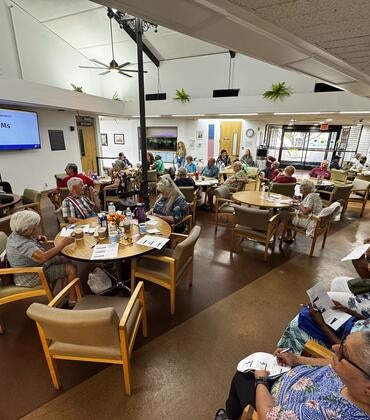
The holidays can be a stressful time for many, with to-do lists that need urgent attention and not enough time to attend to them. Financial concerns can also be a source of stress and anxiety at this time. How best to navigate such stress?
Dr. Peter Ureste, an associate clinical professor in the Department of Psychiatry and Neuroscience at the University of California, Riverside, shares his thoughts in a Q&A on how we can manage holiday stress.
Q: What is holiday stress and what are its causes and symptoms?
As December brings a variety of holidays to celebrate, many of us experience a mix of excitement and anxiety in preparation. The holiday season often stirs a range of emotions, from joy to worry and even grief. A recent mental health poll revealed that the holiday season causes significant stress for many Americans, with one-quarter reporting higher stress levels this year compared to last. Major contributors to holiday stress include financial pressures, social obligations, family dynamics, and unmet expectations—factors closely tied to the social determinants of mental health. This stress can manifest in both physical symptoms, such as sleep disturbances, fatigue, overeating, and increased alcohol consumption, as well as mental health challenges, including irritability, low mood, and heightened anxiety.
Q: Why does our anxiety seem to get worse during the holidays?
Holiday anxiety often stems from time pressures, overstimulation, and financial strain from planning, social events, and gift-giving. The season can also evoke grief or heighten loneliness, particularly for those distanced from family or lacking social support. The focus on joy and togetherness may deepen feelings of isolation for individuals coping with loss or strained relationships.
Q: How can holiday stress be managed?
Many people cope with holiday stress by using strategies such as talking to others, adjusting their expectations, reminding themselves the season is temporary, or volunteering to help others. Setting boundaries, practicing self-compassion, and practicing dialectical thinking—acknowledging that the holidays can be both stressful and a time for well-being—can also be helpful. Despite its challenges, the holiday season offers opportunities to strengthen relationships and create meaningful moments.
Q: Many feel the pressure to purchase gifts, be in the spirit, and buy into something that is not important to them. How do they navigate a holiday that is more for others than them?
Navigating a holiday that feels more for others than yourself can be challenging, especially when societal expectations don’t align with your values. To find fulfillment, focus on creating personal traditions that resonate with you, such as volunteering, spending quiet time with loved ones, or engaging in intentional self-reflection. It’s also important to set clear boundaries with others to avoid feeling pressured to conform. By prioritizing what matters most to you, you can make the season meaningful and fulfilling, even if it doesn’t align with broader societal or cultural norms.
Q: How can we not let other people’s expectations drive us during the holidays?
To avoid letting others’ expectations drive you during the holidays, reflect on what the season means to you and prioritize activities that bring you joy or align with your goals. Set clear boundaries by saying “no” to excessive demands and using assertive communication to protect your time and energy. By focusing on what truly matters, you can create a more meaningful and fulfilling holiday experience.
Q: How can we build self-awareness to avoid using food to address sadness and loneliness during the holidays?
I really appreciate the emotional competence framework developed by psychiatrist Dr. Loma Flowers, which outlines three types of emotional responses: instant, considered, and developmental. In each of these responses, self-awareness plays a critical role both in the short and long term. To avoid using food to cope with stress or loneliness during the holidays, focus on building self-awareness in the moment (instant and considered responses) and over time (developmental response). One way to do this is by increasing one’s feeling fluency, which is the ability to accurately identify, label, and understand one’s emotions. Other helpful methods include journaling, practicing mindfulness, and recognizing triggers for emotional eating.
Q: How do financially constrained families manage their children’s expectations of gifts?
Financially constrained families can manage their children’s gift expectations through open communication about the family’s financial situation. By setting realistic expectations, children can better understand limitations. Emphasizing experiences or handmade gifts as meaningful alternatives reduces financial strain while fostering creativity and connection. Joint activities like cooking or baking together, spending time in nature, or creating DIY gifts highlight the value of shared moments over material items, teaching children the importance of togetherness and thoughtfulness during the holiday season.
Q: How do you not give gifts you think your kids are not ready for? For example, a smart phone.
To avoid giving a smartphone when your child may not be ready, focus on age-appropriate gifts that promote open-ended play or creative activities. Communicate with other gift-givers to manage expectations. Explain that your child isn’t yet ready for the responsibilities of a smartphone, such as managing screen time or social media. Propose revisiting the idea in the future or consider simpler devices, like a basic phone for emergencies.
About Peter Ureste:
Before joining the UCR School of Medicine and UCR Health, Ureste was a faculty member at UC San Francisco for seven years, working closely with pre-medical students, medical students, and residents as a clinician educator. Born in Riverside and raised in the Inland Empire, he identifies as a first-generation college graduate, gay, and Latino — experiences that shape his approach to learners and patients.
Ureste attended medical school at the University of Illinois at Chicago, completed his adult psychiatry residency at the University of Southern California, and pursued fellowship training in geriatric psychiatry at UCSF. He holds a master’s degree in academic medicine from the University of Southern California and is board-certified in general adult and geriatric psychiatry.
He is an active member of the Association for Academic Psychiatry, the American Association of Directors of Psychiatric Residency Training, and the American Association for Geriatric Psychiatry, serving on multiple national committees. His professional interests include professional identity formation, trauma-informed medical education, public psychiatry, and mentoring trainees from historically excluded backgrounds.
Header image credit: maruco, iStock/Getty Images Plus.




